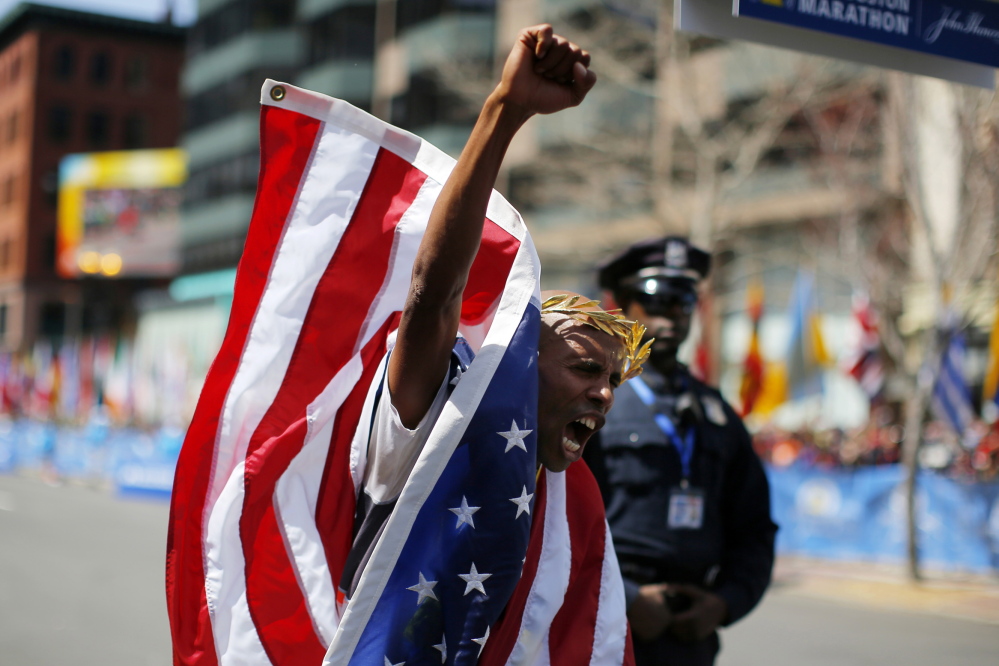BOSTON — Before Meb Keflezighi embarked on the 26.2-mile journey Monday to become the first American man to win the Boston Marathon since 1983, he wrote four names on his yellow race bib.
Martin, for Martin Richard.
Krystle, for Krystle Campbell.
Ling, for Lu Lingzi.
Sean, for Sean Collier.
The first three died in the bombings that occurred near the finish line of last year’s race. The last was shot and killed, investigators said, by one of the alleged bombers.
“It could’ve been me, my wife or me watching as a spectator,” said the 38-year-old Keflezighi, who was born in Ethiopia in 1975 and came to the United States with his family in 1987.
The four names scrawled in black marker permeated Keflezighi’s 2 hours 8 minutes 37 seconds winding past chants of “USA!” and “Boston Strong” T-shirts. On a day when almost 36,000 runners started the race shadowed by heightened security and even more emotion, he provided a fitting ending.
Kenya’s Rita Jeptoo won the women’s race in a course-record 2 hours, 18 minutes, 57 seconds, defending the title she won last year but could not celebrate because of the tragedy.
Last year, an injury kept Keflezighi out of the race and in the grandstands on Boylston Street near the finish line. He departed five minutes before the first bomb exploded.
This time he repeated that popular mantra, “Boston Strong,” and his own invention – “Meb Strong” – to spur himself on. As he fought to maintain a sizable lead during the race’s final miles, his thoughts turned to the names on the bib between prayers for the strength to finish.
In the process, Keflezighi delivered the first Boston victory by an American man since Greg Meyer in 1983.
“It couldn’t happen at a better time to win for the United States,” Keflezighi said.
A sore hamstring made the prospect of an all-out surge for the finish unwise. So, Keflezighi and his coach, Bob Larsen, focused on maintaining an even pace. By 17 miles, Keflezighi owned a lead that assured no dramatic finish would be necessary.
The pack, including second-place finisher Wilson Chebet of Kenya, failed to reel him in. Even a wave of nausea 22 miles in didn’t throw off Keflezighi.
“I always told people I thought he could do really well on this course,” said Larsen, who believed this was the strongest men’s field in a marathon that started in 1897. “We couldn’t have scripted this any better.”
Keflezighi kissed the pavement and wept after he crossed the finish line. Later, still wearing the winner’s laurels, he talked about trying for the Olympics in 2016. He talked about the 11 companies that now sponsor him. He talked about being most comfortable in front. He talked about history.
Behind every grin and quip, however, the finality of the four names on his race bib lingered.
“This is for the victims,” Keflezighi said. “We can’t get them back.”
Send questions/comments to the editors.



Success. Please wait for the page to reload. If the page does not reload within 5 seconds, please refresh the page.
Enter your email and password to access comments.
Hi, to comment on stories you must . This profile is in addition to your subscription and website login.
Already have a commenting profile? .
Invalid username/password.
Please check your email to confirm and complete your registration.
Only subscribers are eligible to post comments. Please subscribe or login first for digital access. Here’s why.
Use the form below to reset your password. When you've submitted your account email, we will send an email with a reset code.